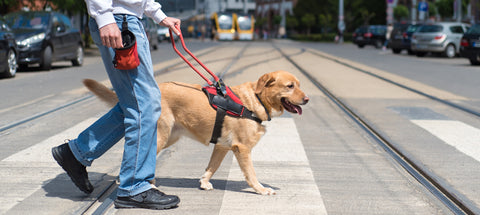Our beloved pups are inquisitive creatures, always keen to sniff out new things and eat whatever they can get their paws on. Unfortunately, sometimes that means ingesting a substance that doesn’t agree with them, which can lead to poisoning and make your pet very unwell. Here, we’ve delved into the topic of dog poisoning including the symptoms of poisoning in dogs, what substances and foods are poisonous for dogs, and what you should do if you suspect your dog has eaten something poisonous. Read on for the full guide and to find out how to get your four-legged friend the help he needs.
What are the signs of poisoning in dogs?
First things first, there’s a good chance you suspect your dog has eaten something poisonous if you’re reading this article. So, see if you recognize any of these common dog poisoning symptoms and you’ll know if you need to investigate further.
Your pup might:
- Be more agitated than usual, overly irritated, or acting out of sorts
- Be suffering from blurred vision, which may make them wobbly on their feet
- Be experiencing breathing difficulties, which is a sign of a serious toxin and cause for alarm
- Be suffering with diarrhea and/or vomiting
- Be excessively drooling
- Be showing an increase in heart rate
- Lose consciousness, which is a clear sign to head to the emergency veterinarian
Symptoms aside, you may simply have watched in horror as your dog ate something toxic before you were able to intervene. If you have good reason to suspect your dog has eaten something poisonous, even if they’re yet to display any symptoms, always remember it’s better to be safe than sorry and head straight to your veterinary center.
Substances that are poisonous to dogs
Dog poisoning is alarmingly common, and it’s no surprise given the number of random items our pooches attempt to eat – particularly when they’re puppies.
Sometimes, a dog can be allergic to a certain substance or food, in the same way as a human can have specific allergies or intolerances. Oftentimes though, the culprit is a substance that is known to be toxic for dogs, so it’s worth getting familiar with the most common foods and substances to avoid at all costs.
Chocolate
Is chocolate poisonous to dogs? In a word, yes. Chocolate poisoning in dogs is a real problem, mostly because chocolate is so commonly found around the home and not an item you’d necessarily think to hide away from your pooch. It becomes even more of a problem when well-meaning friends or children offer your four-legged friend some of the sweet stuff without even realizing it could be poisonous, so you’ll need to be on the lookout.
The substance in chocolate that causes the issue is theobromine, a toxin to dogs that can cause anything from vomiting and diarrhea in dogs to abnormal heart rhythms. The darker the chocolate, the more toxic it is, so keep this sugary substance well away from your pet – no matter how much they’d love to eat it.

Slug and snail pellets
Out in the back yard? Trying to keep those pesky slugs at bay? Be mindful of what chemicals and products you’re using to do so, as slug and snail pellets can make your dog very sick. An ingredient to look out for is Metaldehyde, and poisoning from Metaldehyde can quickly lead to death in dogs. Your pet may start to seem a little wobbly at first, but can deteriorate rapidly and suffer convulsions and respiratory failure.
Another thing to be wary of is rat poison, which can cause excessive bruising or bleeding if your pup manages to eat it. If you’re using any type of poison at home, especially if it contains bromadiolone, difenacoum or warfarin, it needs to be kept well away from your dog at all times.
Grapes, raisins, sultanas and currants
That’s right, these innocent looking fruits can be toxic to dogs, and that doesn’t change if they’re cooked or baked. The chemical that causes the problem is Vitis Vinifera, which can be fatal for dogs even in tiny amounts, yet this is one of the lesser-known foods that are poisonous to dogs.
The component that scientists think causes the problem is tartaric acid, which can be fatal for dogs. Symptoms may start with vomiting and diarrhea but kidney failure can rapidly develop. So if you suspect your dog has eaten some, but you’re not sure, it’s always worth speaking to your veterinarian.
Medicines
These pups will eat anything, won’t they? And yes, that includes a stray tablet that falls out of the medicine cabinet and onto the floor. Non-Steroidal Anti-Inflammatory drugs (NSAIDs), while handy for humans, can be toxic if eaten by dogs. Ibuprofen is one such drugstore staple that can cause anything from vomiting to bleeding in the gut and kidney failure, so it’s important to keep these locked away.
Vitamin D tablets and paracetamol are other items you might have at home that can case problems for dogs. Don’t ever be tempted to administer human medicines to your dog. Speak to your veterinarian and they can recommend medication that doesn’t contain chemicals that are harmful to dogs, as well as the correct dosage.
Cleaning products
You know how you always keep the dishwasher detergent away from little kids? The same applies to dogs. Those neat little tablets that go in the wash also look a lot like sweets – and it’s a concern that your pooch might try to eat them.
To be safe, it’s best to keep all household cleaning products well away from your four-legged friend, in a locked cupboard they can’t access. If they manage to eat them, your precious pet could suffer from all sorts of serious complications, so always be extra cautious.
Poisonous plants
While they’re sniffing around in the back yard there’s every chance your dog is going to come across something they fancy eating – so be aware that some common plants are poisonous for dogs. The same applies inside with some houseplants, which can cause issues if your four-legged friend eats their leaves or petals, or even just brushes up against them.
The tomato plant, for example, can be very tempting for dogs (and their pet parents!) but can cause stomach issues and drowsiness. So too can aloe vera, ivy and milkweed. This list of common poisonous plants for dogs will come in handy and features 16 of the most common suspects.

What should I do if my dog has been poisoned?
It’s important to stay calm and think clearly if you suspect poisoning, because the more information you can provide the veterinarian with, the better the outcome will be for your canine companion.
Firstly, move your dog away from the source of the poison and try to work out what they’ve eaten or come into contact with.
Next, contact your veterinarian and explain what’s happened, and if you have packaging from the item they’ve ingested, make sure you take it with you when you take your pooch in to be examined.
Whatever you do, don’t try to self-medicate your pet while you wait, and don’t try to make your dog vomit or drink salt water. You could clean their fur if the substance is still present, but the priority is to get them to the vet – being mindful to keep them away from any other pets and children in the house.
Your vet will ask you lots of details about your pet, so be armed with the following information:
- Breed
- Age
- Sex
- Weight
- Symptoms
- What they’ve eaten, if you know
- How much they’ve ingested
- When they ate it
How to avoid poisoning in dogs
It’s really difficult to stop a dog from sniffing out everything and anything, and exploring with their nose (and their mouth!) is how they learn. But, it’s still possible to keep a close eye on them and make sure they’re not coming into contact with known toxins, to ensure you don’t find yourself faced with a case of dog poisoning.
Have a read back through the list of known toxins for dogs and see if you can take steps to remove any potential hazards – especially at home. For example:
Make sure any houseplants are out of reach, including the petals that fall from them.
Lock your cleaning cupboard so that all household chemicals, washing detergents and potential toxins are well and truly out of the way – even for a curious canine.
Have a good look around your back yard and see if you’re harboring any plants that are poisonous to dogs. It’s especially important if you’re going on vacation with your pooch and staying in an unfamiliar place.
Keep a close eye on your dog and what they eat – making sure they’re not being fed toxic foods like chocolate or grapes in particular. Children in particular may not realize how harmful a square of chocolate can be, and won’t know that sharing their sweet treats could have consequences.
If you’re using slug pellets or rat poison, they need to be kept well away from your dog. Remember that your pooch will be tempted to sniff them out – however careful you’re being – so it’s worth checking the ingredients for toxic chemicals and choosing products that aren’t hazardous to dogs.
Be vigilant with any medication, taking care not to leave tablets within reach of your dog. If they spot something that looks edible, they’re guaranteed to give it a try, and something as simple as an Ibuprofen could cause severe side effects.
Is there anyone else I can contact for dog poisoning?
Your veterinarian should be your first contact, and should be able to offer you an emergency appointment in the case of suspected poisoning. The American College of Veterinary Pharmacists also has a Pet Poison Control Center hotline you can call if you’re concerned that your pet has come into contact with something poisonous. They also have a handy emergency checklist you may find useful.
Poisoning in dogs
Now you know what to look for, what to avoid and what to do if you suspect your pet has been poisoned, you’re ready to act fast in an emergency. Remember that prevention is better than cure, so if you can remove the hazards you’re already one step ahead.
But if you do find yourself faced with a poorly pooch due to suspected poisoning, don’t beat yourself up – it’s not uncommon – and don’t hesitate to take action. Symptoms can be minimal at first but your dog could deteriorate rapidly, so get them to the vet, pronto.












